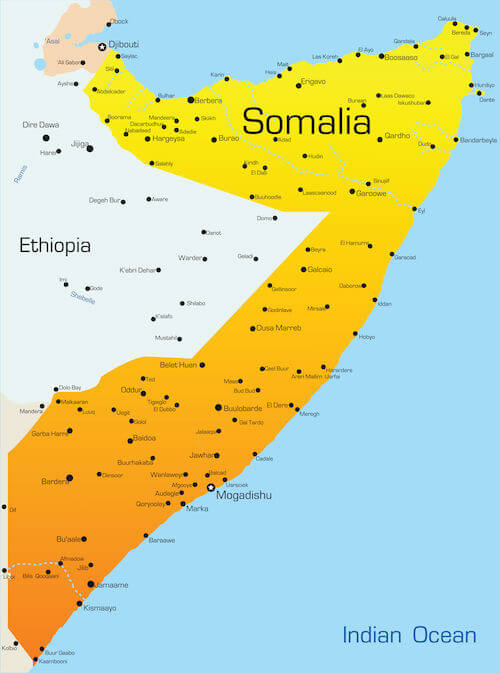English Reading Practice
Somalia
Somalia is a country in Africa. It is located in a part of Africa called the horn of Africa. This area is on the eastern part of Africa. Somalia lies on the water and has coasts on the Indian Ocean.

Largely due to its location, Somalia was a very important trading post in ancient times. "Ancient" means old or a long time ago. Being in Africa, Somalia has easy land access to all of Africa as well as to Southern Europe. Being on the water, Somalia also has easy access to the Middle East, India, and Asia. In ancient times, Egyptians and other North Africans and Europeans traded a lot with people in the Middle East, India, and Asia.
In fact, many historians think that Somalia is the location of the Land of Put. The Land of Put is a place that has never been found but has been read about in ancient Egyptian texts. It was an important trading place for Egypt when Egypt was one of the most powerful nations in the world.
Trade in Somalia
In ancient times, there were two ways to trade goods: by land or by sea. When people traded by land, they had many challenges they faced. For many people, trading by sea was a safer and better option. For people in Europe and Africa who wanted to trade with the Middle East, India, and Asia, Somalia was an important destination in trade by sea.Many different kinds of goods were traded through Somalia. Some of these goods included ebony (a dark wood), cattle, camels, gold, ivory, and animal skins. Other items that were traded included spices and incense. "Incense" is herbs or plants that are burned and smell nice.
Goods were transported by Somali sailors on special Somali ships called beden. Beden ships were large ships that had sails and were very sturdy. "Sturdy" means strong and solid. Somali sailors were very good at navigating the water and were well-known as excellent sailors at the time. Sometimes, they would sail all the way to China to trade goods.
Somalia continued to be an important country for trade until the 1900s. During its long history of maritime trade, Somali sailors developed important tools for navigating the waters. "Maritime" means sea or ocean. Some of the tools that they used were lighthouses and hourglasses.
Lighthouses are buildings on the edge of the land that have a light at the top. These help sailors know where the sea meets the land so that they do not hit the land with their boats.

Hourglasses are made of glass and have sand inside. Sailors would turn them over and let the sand run from one side to the other as a way of telling how much time had passed. Hourglasses were used in ancient times as clocks.

Historians are still doing research and learning more and more about Somalia's influence on ancient trade. While it is clear now that Somalia was a key player in trade in ancient times, historians continue to find more evidence about the goods that were traded and the people that the Somalis traded with.
And now, practice:
Somalia - Exercises
Vocabulary Questions
1. What does "ancient" mean?a) new
b) old
c) modern
d) used
b) old
c) modern
d) used
2. What does "incense" mean?
a) a kind of wood
b) animal skins
c) herbs or plants burned to smell nice
d) gold
b) animal skins
c) herbs or plants burned to smell nice
d) gold
3. What does "sturdy" mean?
a) strong
b) weak
a) big
b) small
b) weak
a) big
b) small
Grammar Questions
1. Somalia is located in _________ part of Africa called _________ horn
of Africa.a) a...a
b) the ...the
c) a...the
d) the...a
b) the ...the
c) a...the
d) the...a
2. In ancient times, there _________ two ways to trade goods: by land or by sea.
a) was
b) were
c) had been
d) will be
b) were
c) had been
d) will be
3. Goods were transported _________ Somali sailors on special Somali ships called beden.
a) in
b) at
c) by
d) of
b) at
c) by
d) of
Comprehension Questions
1. What areas was Somalia connected to by land?_______________________________________________________________
2. What are two items that were traded through Somalia in ancient times?
_______________________________________________________________
3. What maritime tools did Somali sailors use?
_______________________________________________________________
Get Updates, Special Offers, and English Resources
Download your FREE GIFT (the first two chapters of
English Short Stories Book and Workbook)
as soon as you join!

By submitting your email, you consent to receiving updates and newsletters from us and to the sharing of your personal data with third parties for the purposes of sending you communications. We will not spam you. You can unsubscribe at any time. For more information, please see our privacy policy.




